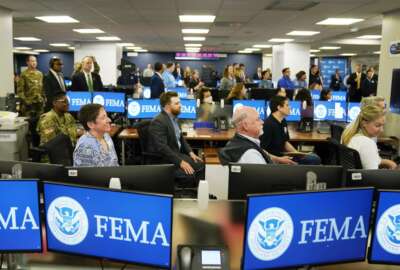To listen to the Federal Newscast on your phone or mobile device, subscribe in PodcastOne or Apple Podcasts. The best listening experience on desktop can be found using Chrome, Firefox or Safari.
- Defense Department civilians must be fully vaccinated against COVID by November 22, according to a new memo pushed out by the Pentagon. DoD put out a timeline for when civilians must get their first and second shots based on the type of vaccine in order to be in compliance. New DoD employees must be fully vaccinated by their start day or by Nov. 22, whichever comes first. The Pentagon already mandated that all of its service members get the COVID vaccine; the military branches are setting the deadlines.
- Military retirees and their families are going to see drug prices increase under the Pentagon’s insurance plan. Pharmaceutical copayments will increase between $1 to $8 starting next year for TRICARE beneficiaries. Active duty troops will still get their drugs for free and medically retired service members will not see an increase in copayments. Prices are likely to continue increasing in coming years. Congress mandated that the Defense Department can continue to increase prices until 2026. The more expensive copayments are meant as a cost sharing mechanism to help keep military healthcare budgets down. Taxpayers spend at least $50 billion a year on the Military Health System. (Federal News Network)
- A former administrator for the Army’s 65th Medical Brigade gets a 12.5 year prison sentence for his role in a fraud and money laundering scheme, which targeted over 3,300 military members. The Justice Department said Fredrick Brown played a role in stealing personal information of thousands of servicemembers and sold it to other collaborators who used it to steal their DoD and veterans benefits.
- The Postal Service, after years of reluctance, is expanding its banking services. USPS launched a pilot program last month giving customers the option to cash payroll and business checks in the form of gift cards. The agency is testing out this service in Washington, Baltimore, New York and Falls Church, Virginia. Customers pay a flat fee of $5.90. USPS won’t issue cash, and won’t accept checks larger than $500. Congress has introduced several bills in recent years that would expand postal banking, but USPS leadership so far has been skeptical of those plans. (Federal News Network)
- One-third of employees at the Federal Emergency Management Agency said they’ve experienced some form of sexual misconduct or harassment. But they didn’t report it because they didn’t think FEMA would investigate their allegations. That’s according to a survey of FEMA employees from the Department of Homeland Security’s inspector general. The IG identified about 300 instances of sexual harassment or misconduct at the agency within a six-year period. But it’s unclear whether FEMA properly handled over half of them. The agency did close 80% of the IG’s recommendations and vowed to improve.
- A key Senate committee wants to update how the government manages its cybersecurity efforts. Agencies and contractors would have to report when they get hit by a cyber attack under a new bill introduced in the Homeland Security and Governmental Affairs Committee. The legislation would update the Federal Information Security Modernization Act for the first time since 2014. It would also position the Cybersecurity and Infrastructure Security Agency as central to the federal government’s response to cyber attacks. The committee is scheduled to mark up the bill this Wednesday. (Federal News Network)
- Department of Homeland Security components have roughly a year to prepare for a post-quantum world. In a new memo published last month, DHS said guidance is forthcoming to help agencies conduct cryptographic technology inventories no later than the third quarter of fiscal year 2022. Plans for transitioning to post-quantum cryptography are due no later than the first quarter of fiscal year 2023. Advances in quantum computing are expected to break current cryptographic techniques that are widely relied upon to protect computer data.
- The federal hiring and internship process isn’t perfect. But Uncle Sam still wants young college students. The Office of Personnel Management said it wants to improve the federal internship programs. But that shouldn’t deter students and recent graduates from pursuing opportunities in government. OPM Director Kiran Ahuja said, “This president’s leadership and my leadership is really working on doing what we call surge hiring. This is actually the moment to come into the federal government. There is a lot of hiring going on, for a lot of good reasons … some very challenging issues like climate change … but we’re also in a phase of rebuilding a lot of these agencies.” (Federal News Network)
- One down, six more to go for the National Institutes of Health IT Acquisition and Assessment Center when it comes to the protests of its CIO-SP4 IT services solicitation. The Government Accountability Office denied the protest of Tata America yesterday. Tata America filed a complaint calling the solicitation requirement to identify corporate experience, including their customers, unduly restrictive of competition. GAO agreed with NITAAC’s decision to require corporate experience as way to avoid fraud and validate an offeror’s claimed qualifications. NITAAC still is facing six other protests that are all scheduled to be decided by early January 2022.
- Airbus Space and Defense Inc. agreed to pay $1.4 million for overbilling the government. The Justice Department found between 2016 and 2017, the company submitted proposals for contracts with unapproved cost rates, and also from 2013 to 2020 charged the government fees for parts it acquired from its own affiliates. This was all brought forth by a former Airbus employee.
- DHS makes a big contract award to build its future technology infrastructure. The Homeland Security Department’s plan to modernize its hybrid computing environment is one step closer to reality. DHS awarded a 10-year, $2 billion contract to Perspecta Engineering for data center and cloud optimization support services. Under the single award task order vehicle, DHS will receive infrastructure-as-a-service capabilities as well as on-premise managed data center services. As part of the contract, DHS is moving out of its current data center hosted by NASA. DHS said the long-term goal of the contract is to transform its IT capabilities to a service-based, customer-centric business model from an asset-based model.
- IRS is running into some hurdles trying to consolidate its case management systems onto one platform. The Treasury Inspector General for Tax Administration finds the IRS’s first migration to its new platform frustrated agency employees, who cited a lack of training and communication about the changes. TIGTA found the IRS’s 1.0 release had 153 internal defects. More than two-thirds were issues with Section 508 accessibility compliance. The IG recommends the IRS implement a scaled agile framework and take steps to ensure the new platform meets Section 508 requirements.
Copyright
© 2025 Federal News Network. All rights reserved. This website is not intended for users located within the European Economic Area.




